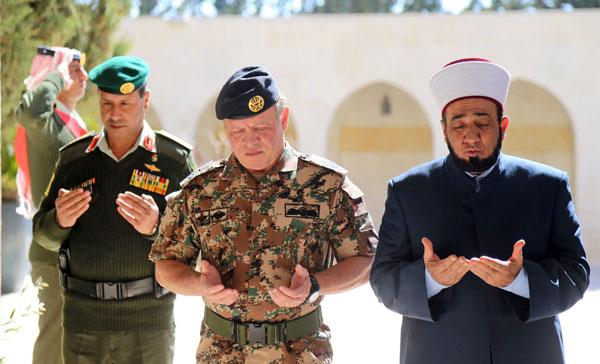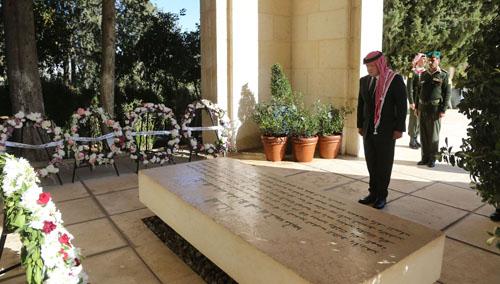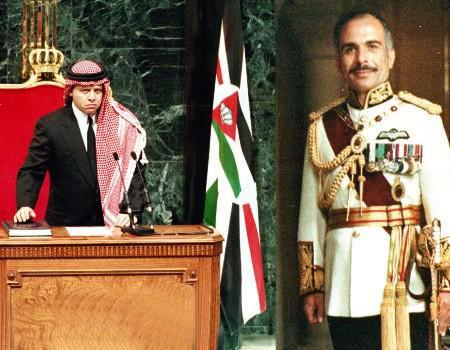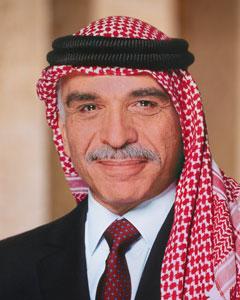You are here
Jordan remembers King Hussein
By JT - Feb 07,2017 - Last updated at Feb 07,2017

His Majesty King Abdullah visits the tomb of King Hussein on Tuesday (Photo courtesy of Royal Court)
AMMAN — Jordan on Tuesday marked the 18th anniversary of the death of His Majesty King Hussein, whose reign spanned nearly five decades.
His Majesty King Abdullah on Tuesday visited King Hussein’s tomb, where he laid wreaths and recited verses from the Koran, according to a Royal Court statement.
Several Royal family members, as well as senior officials and officers, also visited the tomb.
Also on Tuesday, King Abdullah received cables from several Arab and foreign heads of states, congratulating him on the 18th anniversary of his accession to the Throne.
His Majesty received similar cables from senior civil and military officials, congratulating him on the occasion, a Royal Court statement said.
Paying tribute to his grandfather, HRH Crown Prince Hussein posted a photo of the late king on his Instagram account.
“Eighteen years… and Al Hussein’s spirit still lives in us. May God bless his soul and keep His Majesty King Abdullah II and this nation #OurJordan,” the Crown Prince said in the post.
King Hussein was born on November 14, 1935 as the eldest son of King Talal and Queen Zein Al Sharaf.
He studied at the Islamic Scientific College and then enrolled at Victoria College in Alexandria. In 1951, he entered Harrow College in England before receiving his military education at the Royal Military Academy Sandhurst in England, from which he graduated in 1953.
Hussein was proclaimed King of Jordan on August 11, 1952 and a Regency Council was appointed until his formal accession to the Throne on May 2, 1953, when he assumed his constitutional powers after reaching the age of 18, according to the Islamic lunar calendar.
Throughout his reign, King Hussein worked hard to improve his country and raise citizens’ living standards. He also focused on building an economic and industrial infrastructure that advanced the quality of life of the Jordanian people.
During his reign, primary education became mandatory and schools were established across the Kingdom’s cities, villages and rural areas, allowing Jordan to become one of the leading Arab countries in terms of literacy.
King Hussein also focused on improving higher education, with dozens of public and private universities and colleges built under his rule.
He also sought throughout his reign to promote peace in the Middle East.
After the 1967 Arab-Israeli war, he was instrumental in drafting UN Security Council Resolution 242, which calls on Israel to withdraw from all Arab lands occupied in the 1967 war, in exchange for peace. The resolution has served as the benchmark for all subsequent peace negotiations.
In 1991, King Hussein played a pivotal role in convening the Madrid peace conference, providing an “umbrella” for Palestinians to negotiate their future as part of a joint Jordanian-Palestinian delegation.
The 1994 peace treaty between Jordan and Israel was a major step towards achieving a just, comprehensive and lasting peace in the Middle East.
The late King’s commitment to democracy, civil liberties and human rights has also helped pave the way for Jordan to become a model state in the region.
At the time of his death on February 7, 1999, King Hussein was the longest serving executive head of state in the world.
Related Articles
His Majesty King Abdullah on Saturday visited the tomb of King Hussein on the 16th anniversary of his death.
AMMAN — Jordan marks the 20th anniversary of the passing of the late King Hussein today, who died at the age of 63 on February 7, 1999 follo
AMMAN — Jordan on Saturday marked the 80th anniversary of the birth of His Majesty the late King Hussein.On the occasion, His Majesty King A



















